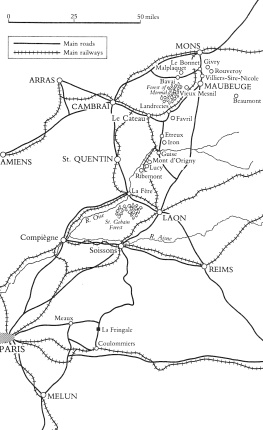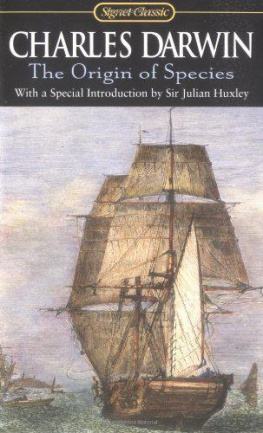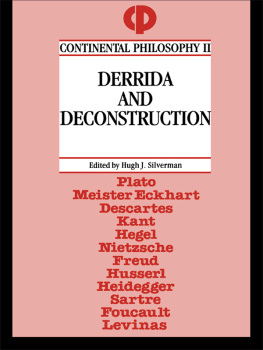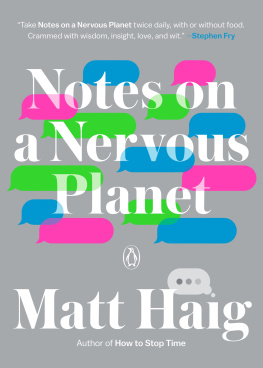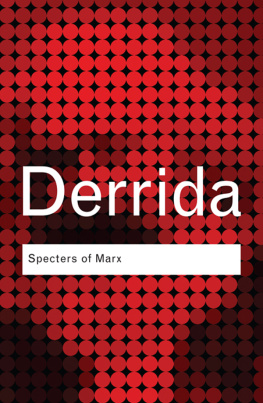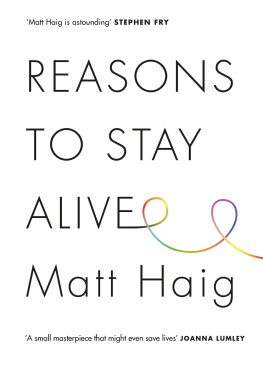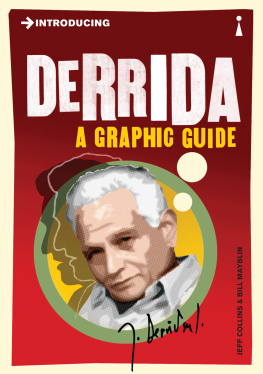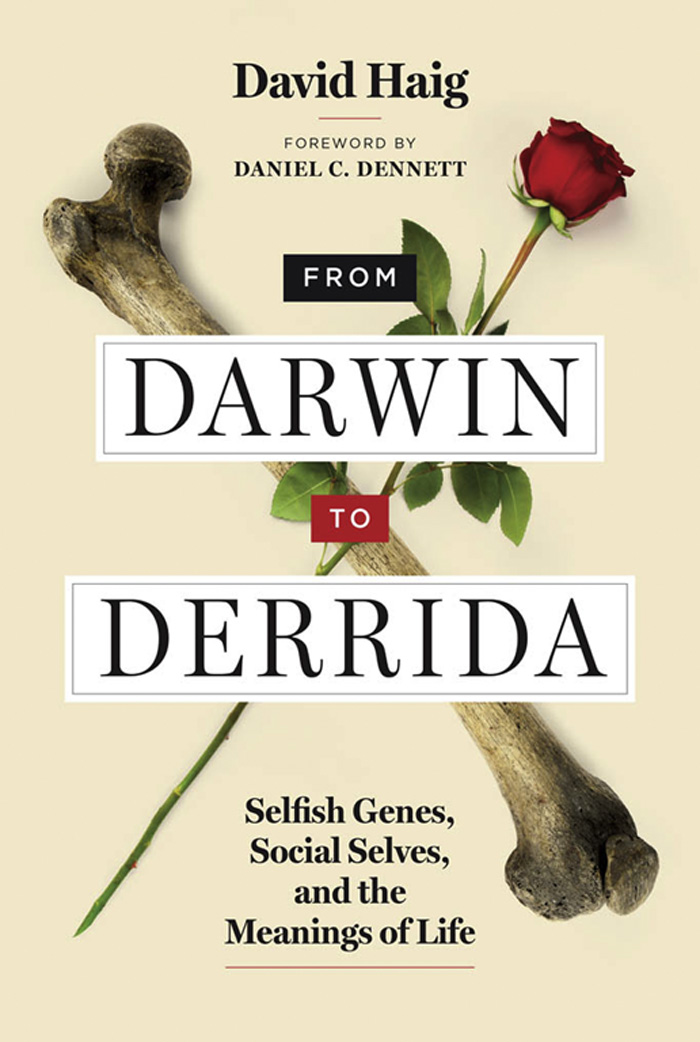
From Darwin to Derrida
From Darwin to Derrida
Selfish Genes, Social Selves, and the Meanings of Life
David Haig
foreword by Daniel C. Dennett
The MIT Press
Cambridge, Massachusetts
London, England
2020 David Haig
All rights reserved. No part of this book may be reproduced in any form by any electronic or mechanical means (including photocopying, recording, or information storage and retrieval) without permission in writing from the publisher.
This book was set in ITC Stone Serif Std and ITC Stone Sans Std by Toppan Best-set Premedia Limited.
Library of Congress Cataloging-in-Publication Data
Names: Haig, David, 1958 author.
Title: From Darwin to Derrida : selfish genes, social selves, and the
meanings of life / David Haig ; foreword by Daniel C. Dennett.
Identifiers: LCCN 2019028387 | ISBN 9780262043786 (hardcover) |
ISBN 9780262358026 (ebook)
Subjects: LCSH: Natural selectionHistory.
Classification: LCC QH375 .H35 2020 | DDC 576.8/2dc23
LC record available at https://lccn.loc.gov/2019028387
10 9 8 7 6 5 4 3 2 1
For my mother, who gave me her seriousness and who, by her choice of my father, gave me his enthusiasm.
Would it not be a far more elegant way of interpreting the two-faced image, to say that Janus and Terminus are the same, and that the one face has reference to beginnings, the other to ends? For one who works ought to have respect to both. For he who in every forthputting of activity does not look back on the beginning, does not look forward to the end. Wherefore it is necessary that prospective intention be connected with retrospective memory. For how shall one find how to finish anything, if he has forgotten what it was which he had begun?
Augustine of Hippo
Contents
Foreword
Daniel C. Dennett
This joyful book tells the story of how meaning came into existence, and how we ourselves came to be able to make sense of our world. It blithely ignores hostile boundaries and unites philosophy and science, poetry and biochemistry, Shannons mathematical theory of information and good old-fashioned literary scholarship. What could you possibly learn from Aristotle or Francis Bacon about the dynamics of gene regulation, and what could you possibly learn about literary interpretation from the role of retroviruses in rewiring placental regulatory networks? Do scientists have anything to gain by learning the history of their own fields, and can scholars in the humanities and social scientists strengthen their grip on their own fields by learning some of the fascinating details of microbiology? Having aroused the passions of partisans on both side of this great divide, I want now to invite them on a roller-coaster ride of ideas, dexterously drawn by David Haig from an astonishing range of sources, from Laurence Sternes curious novel Tristram Shandy (1759) and Immanuel Kants Critique of the Power of Judgment (17901793) through the work of Charles Sanders Peirce and Jacques Derrida to the latest peer-reviewed articles on the intricate machinery of gene transmission, duplication, and expression. The ride is all the more exciting because it is in the form of elegant arguments conducted with calm confidence, unfolding a novel vision of life without fanfare or special pleading, letting the implications speak for themselves.
Philosophers, according to a threadbare stereotype, concern themselves with the old question:
- What is the meaning of life?
And hard scientists, according to another threadbare stereotype, set that question aside, postponing it indefinitely, while they work on a more respectable set of questions, ultimately physical or mechanical questions about how things work, not why:
- What is matter?
- What is time?
- How do molecules do what they do?
- How did life arise and how do living things stay alive?
These stereotypes have been baked into powerful presumptions, separating the arts and humanities, with their goals and methods, from the sciences, with their differing (and opposing) goals and methods. Geisteswissenschaften (literally, sciences of the mind) versus Naturwissenschaften (literally, sciences of naturein the broadest sense, which includes moons and mountains, oxygen and oceans). Lawless narratives to the left, laws of nature to the right.
These traditional dividing lines have been taught for centuries, and are still taught today, but they have to be taught, since we all know better! We all know that there are reasons why the intricate organs of living things are the way they areif only we can discern themand we all know that the meanings we find in our arts and humanities are real phenomena, certainly as real as the meanings scientists find and transmit in their equations. There must be a way of putting matter and meaning, mechanism and purpose, causation and information, into a unified perspective.
And for over a century and a half we have understood, at least dimly, that the key to this unification lies in Darwins dangerous idea of evolution by natural selection. In very different ways this has become common ground for many deep thinkers from Darwins own day to a growing assembly of biologists, physicists, psychologists, and philosophers in the twenty-first century. Aristotles Final Causethe telos or what for? questionhas been absorbed, somehow, by Darwins proposal that life is designed by a blind, purposeless process of differential replication, from which emerge productsliving things and their artifactswhich themselves have purposes. But how is this possible? There is still an unresolved tension, epitomized by the oft-quoted exultation by Karl Marx when he discovered Darwins Origin of Species:
Not only is a death blow dealt here for the first time to teleology in the natural sciences but their rational meaning is empirically explained. (Marx, letter to LaSalle, 1861)
Does Darwins idea explain teleology, or explain it away? It does both; it shows how real purposes, real functions can arise out of phenomena that themselves have no purpose, no function. But in the eyes of many, this is a dubious assertion, wishful thinking at best, or self-deception. Aristotles telos is a seductive idea but it smells... divine and hence anathema. Should we puritanically abstain from teleology when doing science (but not when doing literature, history, philosophy, psychology), or has Darwin shown us how we can tame Aristotles shrew, and make an honest woman of her? (This obstreperous or maybe even offensive way of putting the issue is itself an issue to be considered; the submerged distastes and unarticulated biases of thinkers across the spectrum is exposed in the bright beam of Haigs widely informed attention.)
The details matter, more than one might thinkmore than I had thought until I got swept up in Haigs consummate explanation of how the pieces all fit together. Many of us think we understand evolutionary theory, if not in every minute particular at least in handy if sometimes sketchy outline, and we have tended to think that this is enough understanding to secure a firm foundation for our extensions of evolutionary thinking beyond gene pools and organisms to minds, cultures, and societies. Haig shows that there is much more of value to be gleaned from the intricacies, if we adopt his careful adaptationist perspective, treating all the phenomena of life as susceptible to reverse engineering, seeking the underlying reasons for all the patterns we find in nature. Stephen Jay Gould and Richard Lewontin (1979) famously warned us about the polluting influence of this Panglossian Paradigm (where we supposedly live in the best of all possible worlds) but we must cast aside our residual worries about the risks of this Darwinian paranoia as some have called it, and let Haig lead us into the strange and enchanting (but also disconcerting) world of strategic genes, mindless competitions between renegades and impostors, team players and sentries, robots made of robots made of robots managing to pilot their enormous vehicles into the future without ever having to recognize or appreciate the reasons why they act as they do. This is the world of selfish genes, brilliantly introduced by Richard Dawkins (1976), explored in even more detail by Haig.
Next page

